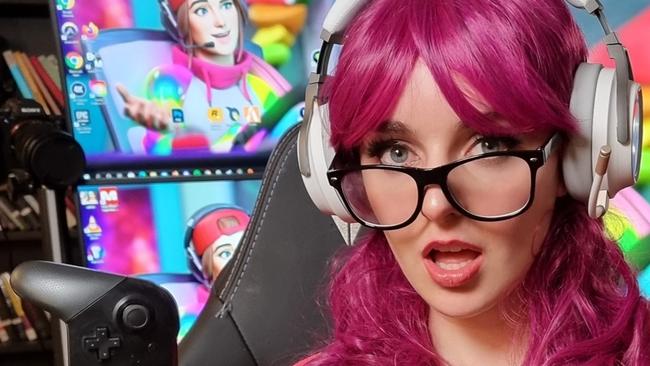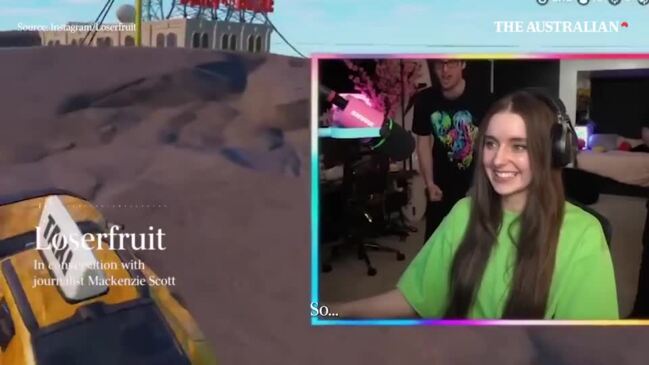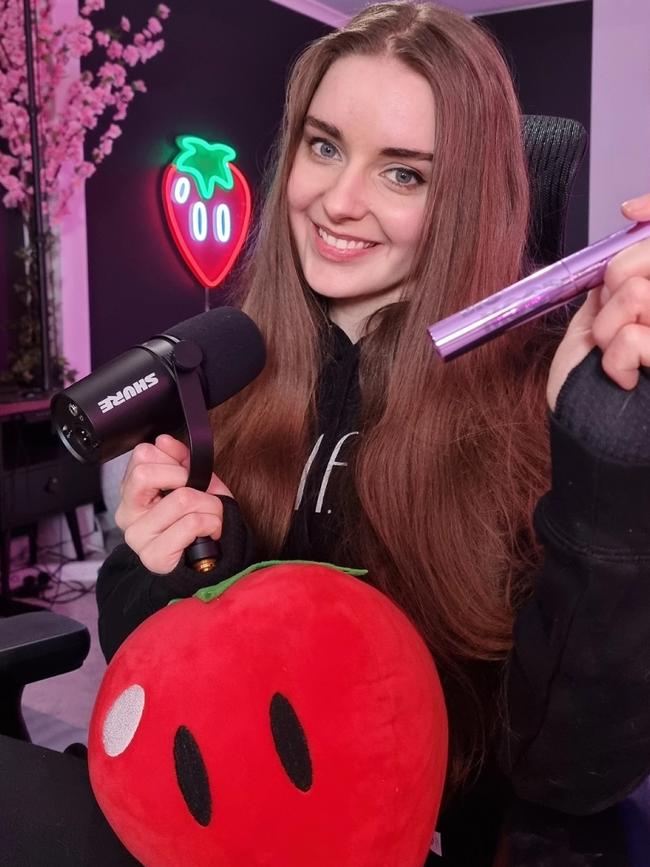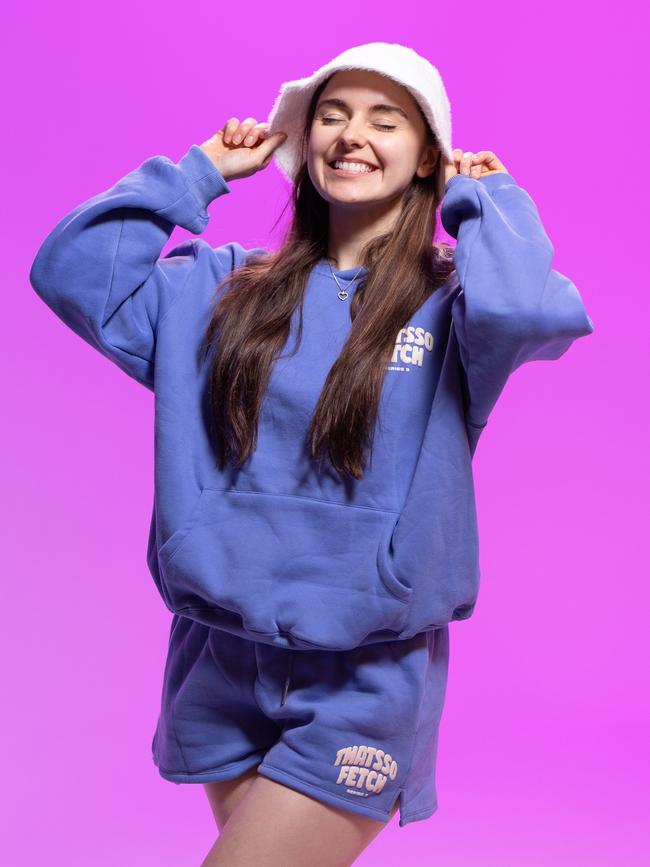Gamer Loserfruit on dismantling the boys club mentality online
Millions of people watch Kathleen Belsten, aka Loserfruit, play video games online. But the 30-year-old influencer says gaming still has a gender problem.

At school in the 2000s, Kathleen Belsten would hide the fact she played video games in her free time.
“I thought it was embarrassing,” she laughs. “It wasn’t a gender thing; gaming just felt embarrassing!”
No one knew she would go on to make a career out of video games and become one of the world’s most recognised women in online gaming.
The 30-year-old from Melbourne is better known as Loserfruit, or Lufu for short. She took her secret habit online a decade ago when she began posting videos of herself on YouTube playing the multiplayer online battle arena-style game League of Legends.
Now, she is followed by millions across her social media profiles. On the popular live-streaming website Twitch, Belsten is followed by 2.9 million people who eagerly await notifications of her hours-long appearances.
That makes her the second-most followed female player worldwide on the site, which is primarily focused on video game live-streams.

“One of the big reasons people told me to start is because there’s not many females doing it,” Belsten says. “Now, half of the content creators I know are female. It’s a massive change.”
She isn’t wrong. Gaming has long been considered a “boys club”. Back in the 1970s and 1980s enthusiasts would crowd around arcade machines and exchange coins to play Space Invaders, Donkey Kong and Street Fighter. Soon after, Sega and Nintendo helped to popularise gaming at home.
By the onset of the pandemic, the gender disparity had almost resolved. A 2020 report from Digital Australia found women aged over 18 made up about 47 per cent of the country’s gamers. The trend continued; Nielsen found women contributed 59 per cent of the 1.8 billion hours Aussies spent playing video games in 2020.

Gaming is one of the fastest growing industries worldwide, expected to be worth $294 billion by 2024, and Australia is keen to get in on the action. In 2021–22, Australian game development studios generated $284.4 million in revenue. Keen to accelerate the boom, the federal government last year announced the digital games tax offset to incentivise large-scale games development in this country.
Belsten is evidence that playing video games can also be a full-time job. She live-streams herself playing video games several times a week for five to 12 hours at a time.
“Ideally in Australia, I should be waking up at 6am to stream straight away (on Twitch), then I would get the American audience and European audience,” she says. “I just have never committed to that. I like to say it’s because I’m loyal to Australian fans – but no, I don’t like to wake up at 6am.”

She also invests hours in content creation, slicing YouTube videos and making her TikToks for her 4.2 million followers. Outside her primary accounts, she frequently collaborates with other streamers and posts vlogs and behind-the-scenes glimpses of her life.
Belsten believes her content helps to dismantle the “boys club” mentality. Much of her career has been built on playing first-person shooter games, starting with Overwatch and now primarily shifting to Fortnite. Considered one of the most popular games in the world, the game’s cartoon imagery combined with social gameplay has helped endear the game to the masses since its release six years ago.
“Surprisingly, out of all the female content creators I know, I’m the only one who plays the most colourful game there is, which is Fortnite,” she says, noting that more women today are playing the game.
“I swear, every time I go online with my squad, it feels like half the strangers I meet are women. It’s definitely not an odd feeling any more.”

While the “boys club image” is eroding, it’s not because women have only just begun to discover gaming.
They just haven’t been seen, says Queensland University of Technology instructional technology and media academic Dr Selen Turkay. Now that women are appearing in traditionally male-dominated fields – particularly in STEM, tech and media – the perception of what is “acceptable” or “normal” for women has expanded.
“This cultural shift has made it easier for women to embrace and openly discuss their love for gaming,” Turkay says. “Women have been gamers for a long time but without visibility.”
Belsten created her Loserfruit persona in 2013, shortly before the rise of #GamerGate, an online movement that exposed the underlying current of misogyny within the gaming community and led to the harassment of female content creators. The internet-culture war rallied against the industry’s growing focus on inclusion in both development and in the playing community.
Several high-level female figures received death and rape treats. Game developer Mattie Brice and gaming journalist Jenn Frank reportedly stepped away from the industry after enduring harassment as a result of the #GamerGate movement.
While Belsten says things have improved, the harassment of women still has yet to abate fully.
A British survey released this year found half of female gamers had received inappropriate messages, with three in four women aged between 18 and 24 affected. Eighty per cent of the comments were reportedly sexual in nature.
“The thing is, voice chat can be a little bit toxic,” says Belsten, describing the online chatroom used by gamers from around the world playing together at the same time. “It happens in games where people are competitive and grind too (much) of their life away online. Then, to hear a female voice, they (men) just tend to blame them for things.
“We’re trying to change that … It used to be a lot worse.”

The impact of the harassment can have lasting effects. The same study found one in 10 women were left feeling suicidal from the abuse, while a quarter developed depression. As a result, female players said they had lied about their gender and remained anonymous to avoid the barrage of harassment.
Belsten’s online community on Twitch is policed by moderators she has appointed to stop hate from flourishing.
She also has inadvertently garnered a large LGBTQI+ following, which she did not expect as a straight woman. But that has helped to curate a culture of acceptance and respect, with men also helping to educate and change the narratives.
“It’s very much like, ‘hey, just treat me right, and we’ll treat you right’ type thing,” she says.
Belsten noted that sometimes she and her moderators “call out” the harassers while playing to educate them and change their behaviour.
“You’ve got to have moderators (in your chat) as a creator; it’s too toxic otherwise,” she says.
“But it’s been good seeing more people held accountable for what they’re saying and what they have said … particularly when there is so much anonymity online.”
However, the broader industry – from developers to marketers – has been slow to react to change, says Turkay, who believes there is still a lack of diversity.
While half of all players are female, that same level of representation has not carried through the entirety of the gaming landscape. A recent study by the University of Glasgow found male characters still get double the speaking time in gaming narratives compared to females, and there is a notable lack of protagonists who are women or minorities.
But some game developers are leading the charge.
Diablo 4 is one of the biggest game releases of 2023. In the latest iteration of the series, which sees the player in a world torn between heaven and hell, the character of Lilith has been elevated into the starring role.
The daughter of Mephisto, Lord of Hatred, and Queen of Succubi demons, Lilith, is on a ruthless hunt to gain power.
“I would actually say that in other Blizzard games as well, a lot of the most overpowered characters tend to be female,” Belsten says. “So, I’m not surprised that they chose Lilith as the main because of the impact she had on previous games as well. They made her an iconic character.”
Indie creators are also helping to pave the way, Turkay says, citing a 2018 title developed by Maddy Makes Games called Celeste, which explores the protagonist Madeline’s struggles with mental health.
“Independent game development has grown exponentially, allowing for a broader range of voices to contribute to the gaming landscape,” she says. “Many indie titles now feature diverse casts, storylines, and themes that might not have found a platform a decade ago.”
While gaming culture has improved during the past decade, there is still more progress to be made. Professional e-Sports is still heavily male-dominated, with millions tuning in to online programs to watch teams compete in tournaments for games such a League of Legends and Dota 2, which offer prize pools of more than $10m at an international level.
Turkay says there needs to be an open discussion between platforms, developers and players.
“Developers and platforms should encourage the creation of inclusive and supportive gaming communities,” she says. “This can be achieved by spotlighting female gamers, hosting events focused on diversity, and promoting positive online interactions. Companies should be mindful of how they market games, ensuring they don’t perpetuate gender stereotypes.
“In a similar vein, game companies should actively seek feedback from diverse player bases to understand their needs, preferences, and concerns. This feedback loop ensures that games resonate with a broader audience and are more inclusive in nature.”
As for Belsten, she believes there are more women in the wings.
“People are just a lot more open about it now, but a lot of women are still just playing in secret.”



To join the conversation, please log in. Don't have an account? Register
Join the conversation, you are commenting as Logout